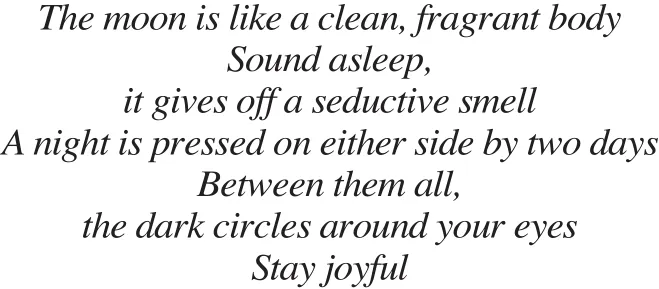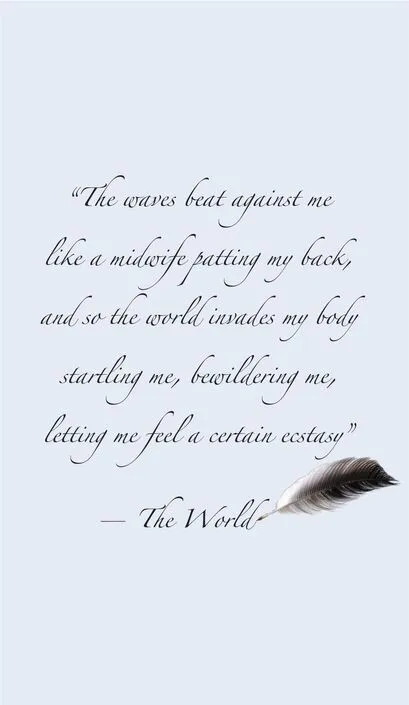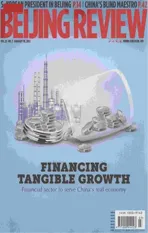Sound of Solitude
2012-10-14ChinapremierpoetessbreaksthemoldinpursuitofartByYuYan
China’s premier poetess breaks the mold in pursuit of art By Yu Yan
Sound of Solitude
China’s premier poetess breaks the mold in pursuit of art By Yu Yan
Passion for poetry heated the art museum of the China Central Academy of Fine Arts on a cold winter night. Famous poets, old and young, as well as art lovers gathered from across China in the museum in Beijing on December 28, 2011. They recited their favorite poems, and shared their most subtle feelings of life and society.
Of them, poetess Zhai Yongming drew the most applause. “For me, poetry plays the role of religion. It brings me the most joy,”said Zhai. “There are various changes in life that one can’t control. The only thing I can control is writing poetry. Through writing poems, I express my ideas and prove my existence. That’s why I say poems have never let me down.”
Born in Chengdu, capital of southwest China’s Sichuan Province in 1955, Zhai is renowned as the most outstanding modern poetess in China. So far, her poems have been translated into a number of languages including English, German, Japanese and Dutch.
Feminism
In the eyes of her fellow Chinese poets, Zhai is really special. As a talented and beautiful woman, Zhai smokes, drinks, travels a lot,loves pretty dresses, and advocates feminism.
She once said she wished to be a poet rather than a poetess, but in her life she was first and foremost a woman. “I am more interested in expanding the most simple and subtle feelings in my heart, or femininity in other words. Some kind of bigotry makes me over-concerned with the inner world,” said Zhai.
Indeed, feminism has been a prominent feature of Zhai’s poems since she gained fame.
She made her debut with the poetry cycle in 1986 when she published her first poetry sequenceWomen, which consisted of 20 poems.Womenshocked the Chinese literature circle with its uniquely weird language style and overwhelming female perspective. It triggered the “Black Tornado” of women’s poetry that swept China from 1986 to 1989.
Womenis an excellent example of Chinese feminist poetry. In the preface, she wrote, “As one of the two genders of human beings, women face a totally different world from men from birth. Their single glance of the world bears unique emotions and instincts…”
According to traditional Chinese culture,the feminine is characterized by water, fl ower,and moonlight. All these images are vividly displayed in Zhai’s works, like the description of the moon in one poem fromWomen,translated by Simon Patton:

Her other poetry collections includeAbove All the Roses(1989),Collected Poems of Zhai Yongming(1994),Plain Songs in the Dark Night(1997) andFourteen Plain Songs(2011).
Path to poetry
Zhai has kept her love and passion for poetry her whole life. However, this path to poetry has been fi lled with twists and turns.
She studied laser technologies at college and worked in a physics research institute after graduating in 1980.
The work emphasizing preciseness and seriousness never hindered her enthusiasm for poetry. She wrote poems during her spare time and completedWomenin 1983.Later, she printed it in booklets and sent them to her friends in 1984, and published it in 1986.
However, such a soul with strong love for freedom conflicted fiercely with the working environment of the research institute.She felt like an alien in the research center.She was the first to wear jeans. And when she asked for leave to attend an important poetry gathering in Beijing in 1986, her boss expressed clear dissatisfaction.
The suppression at her job made her more clearly realize what she really wanted. At the end of 1986, she quit the job, an extremely bold action in that era in China. Many people thought she was out of her mind to abandon such a well-paid and stable job.
“If I kept working in the research center,it would have taken a long time for me to become a senior engineer,” said Zhai. But she never regretted sticking to the career as a poet despite the low income.
She kept writing poems. In 1990, she went to the United States and lived there until 1992. While living in the United States,her writing was in stagnation. This period was described as “Nirvana” by Zhai. She cut herself off from her past writing and started a new beginning.
“Originally, I mostly wrote poems out of inspirations and observations. With time, I got tired of that kind of writing,” said Zhai.
Especially after she opened the White Night bar in Chengdu in 1998, she changed her previously closed writing style and paid more attention to realistic problems.
“After I started White Night, I had more contacts with real life. These are re fl ected in my writing style and the topics of my poems,”said Zhai.
Unlike other bars in the city, White Night was established as a big club for authors,artists, journalists, as well as literature and art lovers. There were parties and cultural activities from time to time. Through wine and art, the bar brought out the most natural and real side of the people.

FILE

“Each poet has a process of becoming mature. But no matter what kind of expression the poet adopts, it is closely related to the age he lives in. A poet moving toward maturity should not limit his or her attention to his or her own inner heart,” said Zhai.
Therefore, amid the current conditions where more and more poems tend to focus on inner expressions, Zhai chose the vaster and solider real world. The representative of Chinese feminist poetry is moving toward calmness and tolerance in her work.
Poem and life
As far as Zhai sees it, a poet must fi nd a way of living which is good for a writing career.“Zhai is one of the rare people who live totally according to their inner hearts. Her external and internal are consistent,” said Ma Song, a Chinese poet.
Her many fellow poets who were active in the mid-1980s have gone through ups and downs in life. Some have changed their careers, some are still wandering, struggling for a living, and others have returned to the writing desk after a period of business life.
“More than 20 years ago, poetry was a respected art. Throw a little stone at a crowd in the street and you could hit a poet. But now,even a pouring rain can’t hit a poet,” said Zhai.
Poets lost their previous aura of fame.Now when she is introduced as a poet at business parties, she often hears deafening laughter. From the prosperity of the 1980s to the decline of the 1990s, and until now, she has witnessed the vicissitudes of the Chinese poetry cycle.
“I do not think that the change of living conditions or identity can explain all the difficulties poets face in real life. For poets,their careers and identity are both uncertain factors. The only certain thing is poetry’s meaning to them,” said Zhai.
